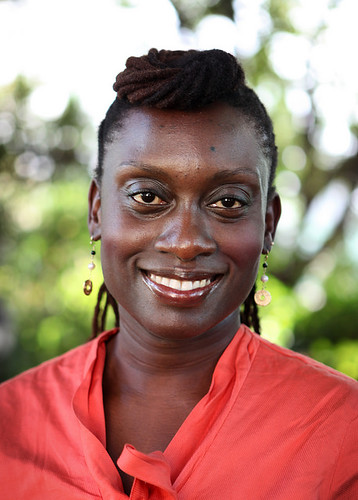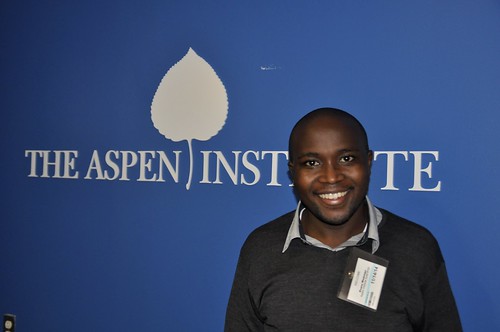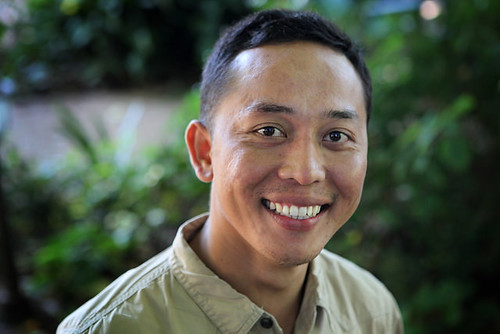A Women Farmers’ Cooperative on a Mission to Decrease Hunger
In Nigeria, one woman is leading her community to use sustainable farming methods, as well as technology, to thrive. A group of women farmers in Nigeria play a pivotal role…
Read MoreLast week, Feed the Future caught up with the 2014 class of the Aspen Institute’s New Voices Fellowship, designed to bring more expert voices from the developing world into the global development discussion. The Fellowship, supported by the Bill & Melinda Gates Foundation, helps recipients sharpen their messages, elevate their stories and communicate their insights across a variety of media platforms, illuminating crucial grassroots perspectives for a broad worldwide audience.
Read on to learn what this year’s class of Fellows had to say about youth in food security and much more!

James Kassaga Arinaitwe partners with secondary schools in Uganda to provide education around entrepreneurship and leadership development for youth. Photo by Meredith McCormack, USAID.
Agriculture should be a fundamental part of education for youth.
“Uganda is one of the youngest countries in the world – 80 percent of the population is under the age of 35. And I understand the challenges these young people face. As a child, I walked seven miles to school every day and usually ate only one meal. It is very challenging to learn when you only eat one meal per day. Agriculture is one of the ways we can help young people get enough to eat and find more opportunities, and I think we can start with our institutions of learning. What if every secondary school had an agriculture class and a garden where students could grow and eat vegetables? Agriculture should be a fundamental part of education for youth.”

Jacqueline Musiitwa’s law firm represents investors and governments in Africa. Her focus is on the importance of good governance and rule of law, and on improving Africa’s standing in the world. Photo by The Aspen Institute.
I think for youth, another important question is: How do I take agriculture to the next level?
“Improving agriculture means addressing a wide range of issues – like, who owns the land and do we have laws that will protect land rights? Do we have the agricultural data we need to help farmers make informed decisions about what to plant and when? How do we make agriculture profitable if storage is bad, transport is bad, and market prices are bad? I think for youth, another important question is: How do I take agriculture to the next level?”

Evans Wadongo grew up in rural Kenya. His social enterprise, Sustainable Development for All, brings solar power and micro-enterprise development to rural communities and has benefited some 200,000 people. Photo by Meredith McCormack, USAID.
“Especially in rural communities with high numbers of youth who drop out of school or cannot find employment, the risk of extremism is a real problem. We need practical solutions, and social entrepreneurship is one of the keys. Sustainable Development For All sets up resource centers where we train youth to create simple solar lamps from recycled materials and, in return, provides them with the initial capital they need to start businesses, many of which are in the agriculture sector. I think if we can make agricultural technologies more accessible, and make agriculture lucrative, more youth will want to get involved in these types of ventures.”

Lindiwe Majele Siganda is the chief executive officer of the Food Agriculture Natural Resources Policy Analysis Network (FANRPAN), where she coordinates agricultural policy research and advocacy programs in 17 African countries. One of her dreams is to become the “Oprah of African agriculture.” Photo by Meredith McCormack, USAID.
“You can’t expect someone to work 16 hours per day and also care for a healthy, well-fed child. That is why it is important to look at women’s labor demands in agriculture and to focus on the 1,000 days between pregnancy and a child’s second birthday to make sure that children receive good nutrition that can prevent stunting.”

Adebisi Alimi is a LGBT advocate and HIV activist, as well as the founder of the Independent Project for Equal Rights-Nigeria, where he served as Executive Director and pioneered several Nigerian LGBT youth initiatives. Photo by Meredith McCormack, USAID.
Our approach to ending hunger should be an inclusive approach.
“We must understand the intersectionality of the challenges that face us. For instance, you cannot just solve the issue of agriculture with land or crops or seeds. The question is: How do I move my crops from point A to point B? How do I sell my harvest? How do I do these things if my sexuality is a barrier to participate in the market? Hunger is not simply a political issue or an economic one – it is a public health issue. Our approach to ending hunger should be an inclusive approach.”

Jensi Sartin is the Indonesia director for the Reef Check Foundation, which documents the health of Indonesia’s numerous coral reefs and devises community-based strategies to protect them. Photo by The Aspen Institute.
“In Indonesia, 60 percent of the population lives along the coastline and 80 percent of their protein source in their diets comes from the sea. If we lose the fight in protecting coral reefs and marine systems, we lose that protein source and we compromise food security and nutrition.”

Ramadhani Abdallah Noor is a doctoral candidate and research associate at the Harvard School of Public Health. His work includes addressing “hidden hunger,” nutrition and food security. Photo by Meredith McCormack, USAID.
“When people are deficient in a nutrient – like vitamin A or iron – they want to be able to eat food that will satisfy that deficiency. Medicalizing the problem with the use of supplements can’t eliminate chronic undernutrition. Instead, if we can sustainably promote nutrition-sensitive agriculture and fortify food throughout the agricultural value chain, we have a better chance of improving nutrition for rural as well as urban communities and eliminating hunger globally.”

Utibe Effiong is a physician and research scientist at the University of Michigan’s School of Public Health. After working as an internist in southern Nigeria, he was inspired to look at the broader determinants of health and healthcare in the developing world. Photo by Meredith McCormack, USAID.
“Whether it is the current Ebola epidemic, poverty or hunger, these are not problems we can fix in just the short term. It is important to address a health crisis or food shortage in the moment, but the long-term policies and solutions are just as critical. What investments are we making in infrastructure or environmental health to mitigate the impacts of a future crisis?”
In Nigeria, one woman is leading her community to use sustainable farming methods, as well as technology, to thrive. A group of women farmers in Nigeria play a pivotal role…
Read MorePhoto Credit: West Africa Trade and Investment Hub February 24 marks the grim second anniversary of Russia’s invasion of Ukraine. The invasion not only brought suffering to millions of Ukrainians,…
Read MoreSource: USAID On this year’s International Day of Women and Girls in Science, learn about the contributions and challenges these researchers face Every year, International Day of Women and Girls…
Read MoreWomen have always worked in agrifood systems, but these systems have not always worked for women. That’s because barriers have stood in their way, preventing them from making their fullest contributions. Last year, the UN Food and Agriculture Organization’s (FAO) “Status of Women in Agrifood Systems” report showed us just how slow progress has been in closing the gender gap in agriculture over the past decade. Their access to irrigation, livestock, land ownership and extension services has barely budged over the past decade. Also, they are facing these challenges at a time of immense global shocks.
Read More